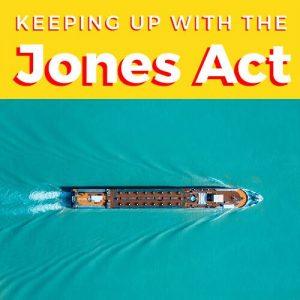
Under 46 USC § 50101, the Merchant Marine Act of 1920 addresses almost every aspect of the shipping industry, and the statute has an enormous economic impact on the United States.
Parts of this law, better known as the Jones Act, also provide protections for sailors and others working on sea-faring vessels. These protections are essential for maritime workers, as they frequently suffer injuries but do not fall under any state’s workers’ compensation program. Keeping up with the Jones Act is critical for anyone working on U.S. vessels.
What Is the Jones Act?
The Jones Act is a “cabotage law,” meaning that it regulates trade between ports located in the same country. The statute requires that vessels carrying cargo between two U.S. ports be built, owned, and staffed primarily by American citizens.
Because the Jones Act requires that so much shipbuilding and operating occur in the United States, the law creates a multi-billion-dollar-a-year impact on the economy and generates nearly half a million jobs. Some argue that a Jones Act repeal is a good idea because the law may drive up the cost of shipping by reducing competition, especially to places like Alaska and Hawaii. However, the legislation generally has bipartisan support.
The Jones Act also establishes vessel maintenance and safety standards, requiring ships to comply with U.S. Environmental Protection Agency (EPA) regulations. Most importantly for employees, the law sets a higher standard of care for employers and allows injured workers to recover damages caused by negligence.

For a free legal consultation, call 800-537-8185
What Is the Purpose of the Jones Act?
There are several reasons for the Jones Act shipping law. Congress passed the law just after World War I, when the United States fleet was largely destroyed. By requiring that a large part of the shipping industry occur solely within the United States, the statute stimulated commerce while also rebuilding a fleet that would be capable of supporting the military in matters of national security.
Perhaps surprisingly, commercial Jones Act vessels have been used for this purpose many times in the century since the law passed. Most memorably, on 9/11, commercial cargo ships surrounding Manhattan performed the largest boatlift in U.S. history, working for nine hours to evacuate nearly half a million people from the island borough.
The Jones Act also makes the U.S. shipping industry a safer and more profitable place to work by establishing safety standards. It gives maritime employees the ability to seek medical care and lost wages if they are hurt at work.
What Ships Are Considered Jones Act Vessels?
The Jones Act only applies to certain vessels carrying cargo between U.S. ports. This means that foreign ships bringing goods into the country are not covered by the Jones Act, nor are ships leaving the United States to take cargo to other countries.
To comply with the requirements and be considered a Jones Act vessel, ships transporting commercial cargo between American ports must meet all four of the following criteria:
- The vessel must fly the U.S. flag.
- The vessel must have been built in the United States.
- The vessel must be at least 75 percent owned by American citizens and/or businesses.
- The vessel must be crewed by at least 75 percent Americans.
Click to contact our personal injury lawyers today
What Is a Jones Act Violation?
There are many types of Jones Act violations. Some common examples include:
- Not meeting requirements of the law: A commercial ship can violate an aspect of this law if it does not meet the four requirements outlined above, yet continues to transport cargo between two U.S. ports.
- Failing to meet all EPA guidelines: The owner of a Jones Act ship may face fines or other penalties if they do not follow all necessary EPA protocols, regulations, and other related rules.
- Failing to meet required safety standards: A Jones Act ship owner can violate the statute by failing to meet the safety standards or being negligent and causing injury to an employee.
Almost any deviation from the process, procedures, and rules outlined in this statute could support a Jones Act violation case.
What Happens When the Jones Act Is Waived?
After a natural disaster, Jones Act waivers are sometimes granted. Although the issue can be much more complicated, essentially, the affected area needs help as quickly as possible. When the President temporarily waives the Jones Act, this action allows vessels that do not meet the four requirements to ship cargo to the site of the disaster.
Although the decision to waive the act is often controversial, sometimes controversy also occurs when a Jones Act waiver is not granted. For example, in the immediate days and months after Puerto Rico was devastated by Hurricane Rita in 2017, the country’s damaged infrastructure meant that it could not distribute all the goods that were arriving in its ports.
According to authorities, the Jones Act requirements were not waived because there was little need:
- There was not a shortage of American vessels; and
- Puerto Rico was not able to handle the cargo that was already being shipped there.
As Puerto Rico continues to recover years later, the issue of a Jones Act waiver remains part of the national debate over how the United States could have provided more effective aid and support, according to a PBS NewsHour report.
Does a Waiver Affect Personal Injury Jones Act Claims?
No. While one part of the legislation is waived for Jones Act ships, the other parts of the law establishing an employer’s duty of care and safety standards still apply. This means that people working onboard a Jones Act vessel have all the same protections as usual, even if a Jones Act waiver is in place.
Ships must also meet all other regulations during this time, except the specific sections of the law waived by those in Washington D.C.
What About Jones Act Cruise Ships?
Are you reading this article and wondering if you would be allowed to book a cruise from one U.S. port and disembark at another? Well, the answer is no, but not because of the Jones Act. The Jones Act only applies to commercial ships carrying cargo.
However, similar regulations apply to passenger ships, including cruise ships, under the Passenger Vessel Services Act of 1886. This law requires that passengers who disembark at a different U.S. port than they boarded pay a $798 fee, even for emergencies.
There are protections for workers aboard cruise ships, as well. Cruise ship operators have many of the same stringent safety regulations as Jones Act ships.
Do You Have a Jones Act Claim?
If you were injured while working in the shipping industry, you may want to discuss your case with a Jones Act attorney who can offer an assessment and advice. Most will work with you on a contingency-fee basis.
If you are struggling to get the medical care coverage and wage loss compensation you need and deserve, an attorney may be able to gather evidence and prove your claim.
A Jones Act accident lawyer can determine what types of claim you have so you can recover what you deserve, even if you are partially at fault for the accident. You may be eligible to file a claim for medical costs, lost income, emotional distress, and further damages.
Connect with an Attorney from Morris Bart, LLC
If you were hurt while working on a sea-faring vessel, a Jones Act attorney at the Morris Bart law firm will discuss your options with you today. We will evaluate your legal options for compensation with you during a free initial consultation. We have office locations throughout Louisiana, Mississippi, Alabama, and Arkansas.
Call us at (800) 537-8185 today.
Questions?Call 800-537-8185
to find a Morris Bart office near you.



